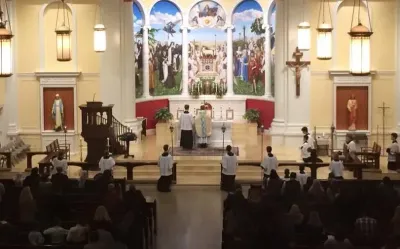Dominik Cardinal Duka – who was Archbishop of Prague from 2010 through 2022 – warned about a 'catastrophic' situation in 'both parishes and schools.'
VATICAN CITY (LifeSiteNews) — Cardinal Dominik Duka urged newly elected Pope Leo XIV to make “evangelization” and "catechesis" his main priorities.
Though too old to be a cardinal-elector, the Czech Dominican prelate made his way swiftly to Rome for the first meeting of the College of Cardinals with the new Pope Leo XIV.
Interviewed shortly afterward by Italian journalist Nico Spuntoni, Duka highlighted what Leo should address in the early stages of his pontificate: “Evangelisation must come first. Secondly, I think we need to revive catechesis.”
Duka, who was Archbishop of Prague from 2010 through 2022, warned about a “catastrophic” situation in both areas he had pointed to:
The situation in both parishes and schools is catastrophic, with significant differences between continents. In the Czech Republic, gender ideology is a huge problem in schools. This ideology is merely a continuation of Jacobinism and communism. Those who support it are not open to cooperation.
Duka suffered persecution and imprisonment at the hands of the Communist authorities in Czechoslovakia during the 1970s and 1980s, and as such has seen firsthand the impacts of a loss of faith in society.
Referencing this aspect, he warned that modern society is not seeing a direct resurgence of blatant Communism but rather “the evolution of communism into modern progressivism.”
There is a move afoot in modern thinking “to transform humanity into machines devoid of knowledge began,” he warned.
Such an element will surely find resonance with Leo XIV, who has made no secret about his intention to address the dangers posed by AI in the modern world. Indeed, even under Pope Francis, the Vatican had been paying increased attention to the growing phenomenon, issuing a document on the topic earlier this year.
As for offering advice on the need for evangelization and catechesis, Duka is a cardinal very well placed to offer an opinion on such.
He was very much in the midst of the debate surrounding one of the most controversial issues of Pope Francis’ pontificate – namely the reception of Holy Communion by the divorced and “remarried.”
He submitted a dubia on the issue in 2023 after the famous 2016 dubia from four cardinals remained unanswered. Under its new prefect, the Congregation for the Doctrine of the Faith provided Duka with an answer which appeared to contravene Church teaching on the issue.
Duka asked whether Pope Francis’ response to the Bishops of Buenos Aires – when the Pope stated there was “no other interpretation” of Amoris Laetitia except the one provided by the bishops of Buenos Aires in allowing Communion for the divorced and “remarried” – could be considered “a statement of the ordinary Magisterium of the Church.” CDF Prefect Cardinal Victor Manuel Fernández wrote that since Pope Francis’ words were published in the Vatican’s official compilation of documents, the Acta Apostolicae Sedes, they were “authentic Magisterium.”
Duka asked again if this statement of the Pope’s to the Buenos Aires bishops was “a decision of the ordinary Magisterium of the Church based on the document Amoris laetitia,” to which Fernández replied:
This document builds on the magisterium of previous Pontiffs, who already recognized the possibility for divorcees in new unions to access the Eucharist, as long as they make a ‘commitment to live in full continence, that is, to abstain from the acts proper to spouses’ as was proposed by John Paul II, or to ‘commit themselves to live their relationship… as friends’ as proposed by Benedict XVI.
Where Francis differed, said Fernández, was that he additionally “admits that there may be difficulties in practicing it (full continence for divorcees in new unions) and therefore allows in certain cases, after proper discernment, the administration of the sacrament of Reconciliation even when one cannot be faithful to the continence proposed by the Church.”
Cardinal Walter Brandmüller had warned before the 2016 dubia about Amoris Laetitia that Francis' interpretation of the text to the Buenos Aires bishops would be heretical.
Duka praised Leo’s early actions of the pontificate and offered a hint of optimism for the future as the American pope begins what could be a papacy of around two decades.

